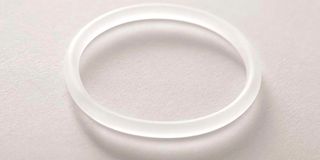Dapivirine ring and oral PreP safe for use by pregnant women

The Dapivirine ring for HIV/Aids prevention.
What you need to know:
- Previously, there was caution for use on pregnant women since there was no data to prove if there are any side effects that may arise.
- The United States National Institute of Health explains that the Dapivirine ring is made of flexible silicone, which continuously releases the antiretroviral drug, Dapivirine, into the vagina, and it is replaced monthly by the user.
- This method of HIV prevention was approved in 2021 by the World Health Organization and was piloted in Kenya last year.
Scientists have found that pregnant women can safely use a Dapivirine vaginal ring together with an oral pre-exposure prophylaxis for HIV prevention.
The research was conducted in Malawi, South Africa, Uganda and Zimbabwe. The expectant women who were part of the study used the two HIV prevention methods from their second trimester and the findings were shared at the 2024 Conference on Retroviruses and Opportunistic Infections in Denver, United States.
Previously, there was caution for use on pregnant women since there was no data to prove if there are any side effects that may arise.
The United States National Institute of Health explains that the Dapivirine ring is made of flexible silicone, which continuously releases the antiretroviral drug, Dapivirine, into the vagina, and it is replaced monthly by the user.
It is estimated that pregnant women are three times more likely to acquire HIV through sexual intercourse compared to their counterparts, from the same age group.
The study involved women aged between 18 and 40. They were given either the Dapivirine ring or Oral pre-exposure prophylaxis for 41 weeks and six days.
“Of 248 pregnancies, one per cent experienced stillbirth or miscarriage, 95 per cent of deliveries were at term and four per cent were preterm,” shows the study.
“Four per cent of live births had congenital anomalies, none of which were related to study products. These trends and other pregnancy complications occurred at a similar frequency to a reference dataset of more than 10,000 deliveries at the same hospitals and no study participants acquired HIV.
With fewer complications based on the data, the researchers from Microbicide Trials Network concluded the safety for use in pregnant women.
This method of HIV prevention was approved in 2021 by the World Health Organization (WHO) and was piloted in Kenya last year.
According to the Population Council, dapivirine vaginal ring had also been cleared for pilot use in Eswatini, Lesotho, South Africa, Uganda and Zimbabwe.
The ring is made of flexible silicone and slowly releases the anti-retroviral drug dapivirine in the vagina over a one-month period, as opposed to the daily pills.
In a move that will see women protect themselves discreetly and on their own terms from HIV infection, the council also signed a memorandum of understanding with Kiara Health, an African-based pharmaceutical manufacturing and healthcare solutions company.
The company received a licence to locally manufacture and sell the ring in order to lower the cost of the product and improve access.
The announcement came at a time when, according to the “Kenya Demographic Health Survey” report, a higher proportion of men (15 per cent) than women (four per cent) reported having two or more sexual partners. Of those with more than one partner, fewer women compared to men reported using a condom.
The KDHS also reported that a woman has an average of between two and three sexual partners and men seven





